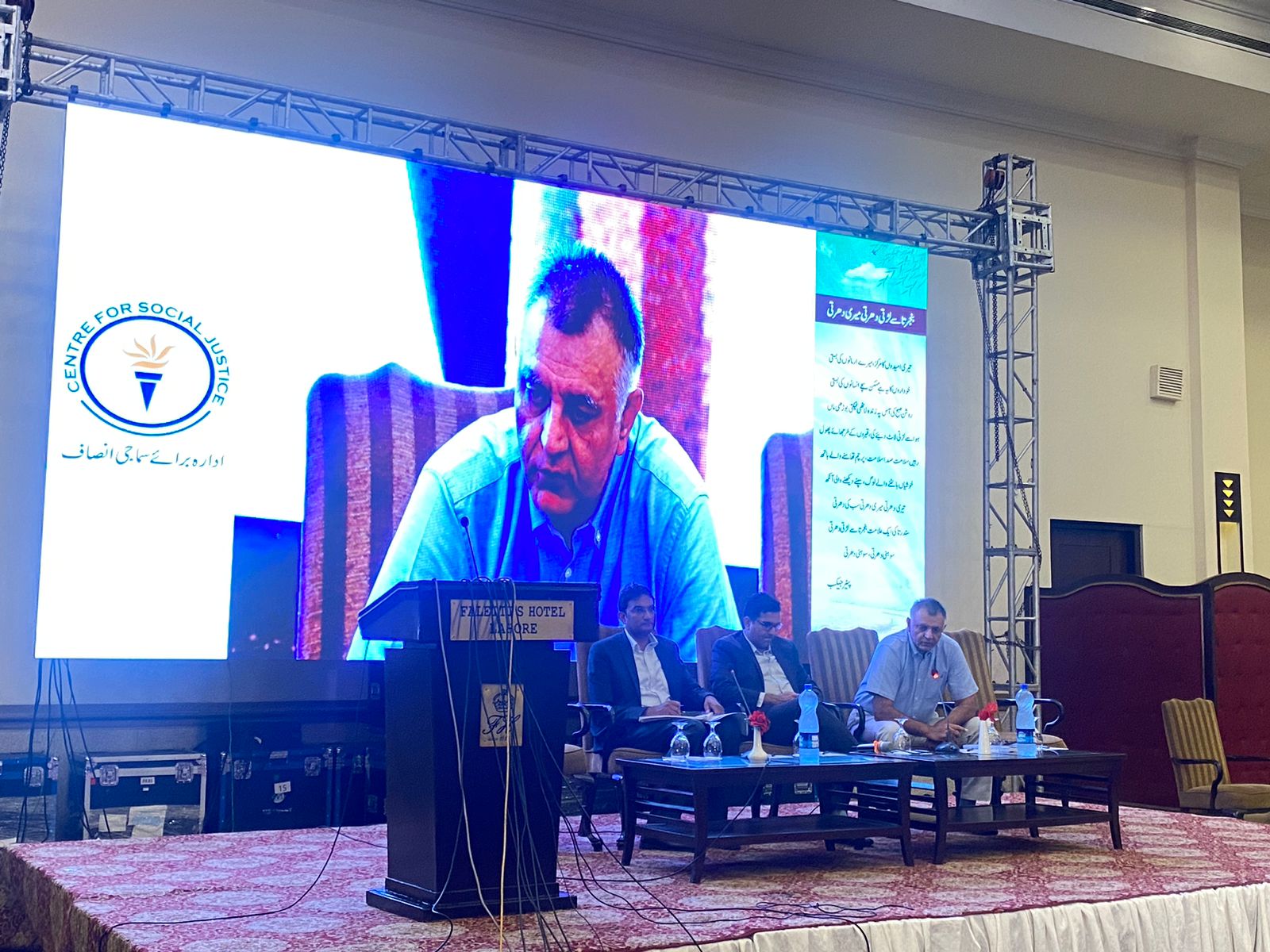Minorities’ Day: Right Activists Demand End to Mob Justice
News Desk
Lahore: Peter Jacob, Executive Director of the Centre for Social Justice (CSJ) urged state institutions to prevent individuals or groups from taking on roles as judge, jury, and executioner and called for strict action against those involved in mob justice.
Jacob made these remarks at an event organized by CSJ in Lahore to mark National Minorities’ Day on Thursday. He expressed grave concerns over the alarming rise in acts of hatred, extremism, and violence disguised as religious fervor. Jacob emphasized that combating extremist ideologies requires promoting a narrative of equal rights, citizenship, and respect for diversity.
He highlighted the need for measures that ensure the state’s equality and neutrality, advocating for a departure from preferential treatment based on majority status.
Ramesh Singh Arora, Provincial Minister for Minorities Affairs, acknowledged the challenges and inequalities faced by minorities and reaffirmed the government’s commitment to protecting the rights and dignity of all citizens, regardless of their religious background.
Barrister Aamir Hassan noted that extremism has evolved into terrorism in Pakistan. He highlighted the significant sacrifices made by PPP leaders in the pursuit of justice, peace, and democracy.
Hassan advocated for incorporating Quaid-e-Azam Muhammad Ali Jinnah’s August 11, 1947, address—which emphasizes tolerance and equality for all citizens—into the preamble of the Constitution of Pakistan.
Barrister Hassan cautioned against accepting extremist ideologies masquerading as political, social, or religious thought that seek to exclude citizens. He urged the government to implement a National Action Plan to effectively combat extremism and terrorism.
Dr Tahir Kamran warned against labeling individuals as traitors or infidels based on their religious, ethnic, sectarian identities, or political views.
He noted that the shift from cultural and religious traditions, such as those embodied by Sufi shrines, to more rigid interpretations has contributed to the rise of extremism.
Dr Kamran called for open debate and public discourse to promote an inclusive and pluralistic society in Pakistan.
Dr Yaqoob Khan Bangash emphasized that state institutions must uphold their authority and prevent any group from imposing arbitrary rule of law.
He advocated for separating culture and religion from extremist ideologies and urged that minority students not be compelled to study the majority religion in primary and higher educational institutions.
Fr. James Channan stated that extremist ideologies can only be defeated if citizens embrace diverse views and beliefs. He envisioned a Pakistan where all individuals live without fear, contributing to a genuinely peaceful and tolerant society.
Nabila Feroze Bhatti highlighted the inherent equality of all human beings in terms of rights and dignity. She called on the state to ensure fair treatment for all citizens.
Suneel Malik, Deputy Director at CSJ, stressed the importance of ongoing dialogue and collaboration among academia, political parties, civil society, and government bodies. He emphasized that such cooperation is crucial for effectively combating extremism and working towards a more secure future for all citizens. How to Tackle extremism in Pakistan
How to Tackle extremism in Pakistan
On National Minorities’ Day, participants of a significant convention revisited Quaid-e-Azam’s vision of a progressive and tolerant Pakistan, as outlined in his inaugural address to the Constituent Assembly on August 11, 1947.
The convention underscored the urgent need to address extremism and its manifestations, emphasizing the government’s role in promoting religious freedom, tolerance, equality, and non-discrimination as national aspirations.
The participants acknowledged the National Action Plan 2014 introduced by the government to combat terrorism, which includes measures to counter religious and sectarian persecution, hate speech, militancy, and intolerance. They also recognized the pledges made by political parties in their electoral manifestos to prevent intolerance and safeguard minority rights.
The convention welcomed recent resolutions passed in the Senate, Punjab Assembly, and National Assembly condemning mob lynching incidents linked to blasphemy accusations in Sargodha and Swat.
These resolutions called for governmental action to protect citizens and prosecute those involved in such heinous crimes.
However, the convention highlighted ongoing challenges, including hate speech and violence against minority communities, with repeated incidents of attacks on places of worship, minority settlements, and target killings occurring with impunity.
Participants admitted that religious minorities face significant discrimination and violence, and stressed the need for creating favorable conditions for minorities to voice their concerns and participate in policy matters.
Reiterating Jinnah’s vision of equality for all citizens, the convention emphasized the need for laws and policies that reflect this vision.
They called for effective participation of minorities in governance and decision-making processes to strengthen measures that enhance access to justice and human rights.
Calls for Action
The convention called upon all stakeholders to address human rights challenges such as religious intolerance, extremism, and discrimination, and urged the federal and provincial governments to undertake the following measures:
Amend blasphemy laws and introduce safeguards to prevent false accusations.
Enact laws to criminalize the forced conversion of minority girls and women.
Balance freedom of expression with the need to prevent hate speech, ensuring that laws do not suppress open debate but curb incitement to violence.
Implement educational reforms in consultation with civil society to improve curricula, textbooks, and examination systems, ensuring they uphold constitutional protections of religious freedom and non-discrimination.
Establish an independent, autonomous National Commission for Minority Rights through an act of parliament to oversee the implementation of minority rights.
Enact legislation to prohibit discrimination, uphold religious freedom, and adopt a zero-tolerance policy towards hate speech, with strict actions against discrimination and violence.
Ensure transparency by encouraging regulatory bodies to publish statistics on hate speech complaints and the actions taken.
Build the capacity of law enforcement and judiciary to better understand and address hatred, discrimination, and violence undermining religious freedom and expression.

Comments are closed.